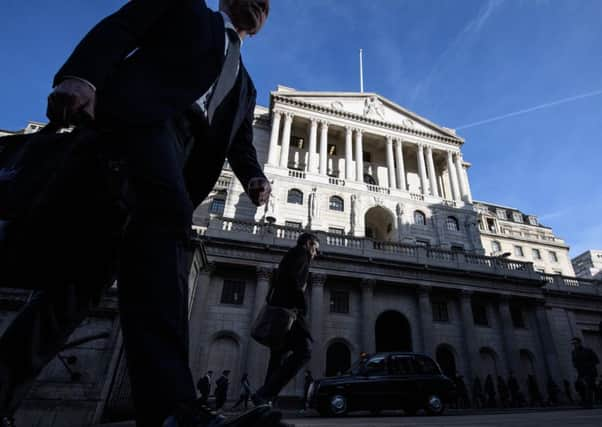Central banks go separate ways on interest rates
This article contains affiliate links. We may earn a small commission on items purchased through this article, but that does not affect our editorial judgement.


Following a tumultuous week at the Bank of England, rocked by the resignation of deputy governor Charlotte Hogg over her undisclosed family links to Barclays, its monetary policy committee (MPC) opted to keep interest rates on hold for another month.
• READ MORE: Charlotte Hogg resigns as BoE deputy governor
However, economists’ eyebrows were raised when it emerged there was a sole dissenter among the rate-setters, with Kristin Forbes calling for a quarter-point increase because inflation is rising quickly and likely to remain above the Bank’s 2 per cent target “for at least three years”.
Advertisement
Hide AdAdvertisement
Hide AdForbes, who is set to finish her three-year term on the MPC at the end of June, has “consistently been at the hawkish end of the MPC”, says Howard Archer, chief UK and European economist at IHS Global Insight, who believes she may have wanted to “get her viewpoint strongly across” before she leaves the Old Lady of Threadneedle Street to return to the Massachusetts Institute of Technology’s Sloan School of Management.
But Neil Wilson, senior market analyst at ETX Capital, says it was not just Forbes’ dissenting voice that struck home, adding: “The minutes paint a picture of a committee moving a lot closer to hiking rates than markets had realised.”
The MPC minutes – published just hours after the US Federal Reserve raised short-term interest rates for the second time in three months and forecast two additional hikes this year – said that some members of the nine-strong committee had noted that it would take “relatively little further upside news on the prospects for activity or inflation for them to consider that a more immediate reduction in policy support might be warranted”.
In other words, if the economy keeps ticking along and prices keep rising on the back of the battered pound, borrowing costs may well increase – but the question remains as to when we will see the first change to interest rates since they were halved to 0.25 per cent in August.
“What we don’t really know is what the BoE judges as good enough growth in demand and wages to warrant tightening,” Wilson points out.
“It warns risks are in both directions – it does look rather like it’s a 50:50 bet on whether rates will rise or fall next, although a cliff-edge Article 50 negotiation would surely see members step back from thoughts of hiking. The danger is growth picks up in the next few months and wages rises as the unemployment rate is so low, making the Bank raise rates prematurely.”
Minutes of the meeting showed the Bank is pencilling in growth of about 0.6 per cent in the first three months of the year, following 0.7 per cent in the previous quarter.
Advertisement
Hide AdAdvertisement
Hide AdThe report added: “Although it was too early to make a confident prediction of growth in the second quarter, there had been relatively little evidence so far from the output indicators of a slowdown.”
Inflation is predicted to rise from the current level of 1.8 per cent to “materially” above the 2 per cent goal over the summer, peaking at about 2.8 per cent, according to the Bank’s forecasts.
James Knightley, senior economist at ING, says: “They may have left policy unchanged, but with Kristin Forbes voting for a hike and the tone of the minutes signalling others may soon join her, [MPC members] are clearly signalling where they think the balance of risks lie.”
But Samuel Tombs, at Pantheon Macroeconomics, says Forbes had made a parting shot by calling for a rate hike, adding that there were “few signs other members will join the new solitary hawk”.
He says it was “not uncommon for outbound members to strike out against the consensus” and believes rates will remain on hold throughout 2017.
That would place the Bank on a markedly different trajectory to the Fed, which is sending out the message that the US economy – equally as dependent on consumer spending as the UK – no longer needs the support of ultra-low borrowing costs and is healthy enough to withstand tighter credit. Indeed, the number of Fed officials who think three rate hikes will be appropriate this year has risen from six to nine.
Many economists think the next US hike will occur no earlier than June, as the Fed wants time to assess the likelihood that Congress will pass president Donald Trump’s ambitious programme of tax cuts, deregulation and increased spending on infrastructure.
In the meantime, savers on this side of the Atlantic are in the midst of a “silent savings crisis”, says Richard Theo, chief executive of online investment platform Wealthify.
Advertisement
Hide AdAdvertisement
Hide AdTheo says: “With inflation currently at 1.8 per cent there’s about £7.98 billion being quietly wiped off Britain’s £700bn cash savings pot each year, thanks in no small part to the persistently low base rate set by the MPC.
“It’s yet another nail in the coffin for cash savings accounts that have been made as good as obsolete for people to grow their money.”